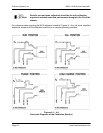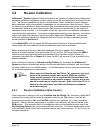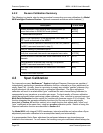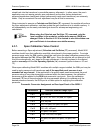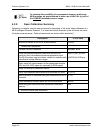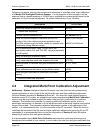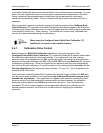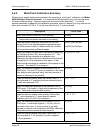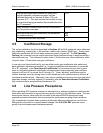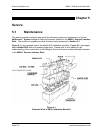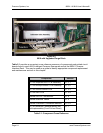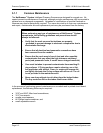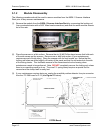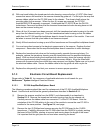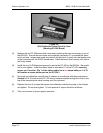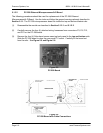
Pressure Systems, Inc. 98RK-1 & 9816 User’s Manual©
Page 109 www.PressureSystems.com
Now that data have been collected for every point
originally specified, calculate and apply the new
coefficient data with a Calculate & Apply (‘02’) sub-
command of ‘C’. This also restores the module to using
its original averaging parameters that existed before the
first ‘C’ command.
C 02
Place calibration manifold back into the RUN position, if
the CAL position was used.
[w0C00]
Store new offset and gain coefficients into transducer
non-volatile memory.
w08
w09
… continue normal data acquisition.
4.5 Coefficient Storage
The various calibration functions described in Sections 4.2 and 4.3 update the active offset and
gain coefficients, respectively, in the module’s volatile main memory (RAM) only. These newer
calibration coefficients will be lost when instrument power is turned off. The Set Operating
Options ('w') command may be used to also store these coefficients back in each transducer’s
nonvolatile memory. This command’s option index = 08 will store new offset coefficients, while
its option index = 09 will store new gain coefficients.
A user may read (and should verify) any new offset and/or gain coefficients after performing
each calibration adjustment command (i.e., by saving coefficient data returned in a command
'h' or 'Z' response), or the Read Internal Coefficients ('u') command may be used to read
them any time after calibration adjustment commands have been performed (see coefficient
indexes cc=00 and 01 for arrays aa=01 through 10). These “adjusted” coefficients may be
verified, and then saved by storing them in each transducer’s non-volatile memory with the 'w'
command described above. Alternately, they may be verified and stored on the host computer’s
secondary storage, and later restored (if necessary) with the Download Internal Coefficients
('v') command (same array/coefficient indexes as 'u').
4.6 Line Pressure Precautions
When operating 9816 pressure scanners at elevated line or reference pressures, care must be
taken when any command is issued that may result in shifting of the calibration valve. The user
must ensure that any valve shifts will not result in the internal DH200 transducers being
exposed to pressure transients that may exceed the proof pressure rating of the transducer.
This is especially important when operating at elevated reference pressures as a shift to the
CAL position may result in a rapid pressure change if the CAL/CAL REF pressure varies
greatly from the measurement reference pressure.



